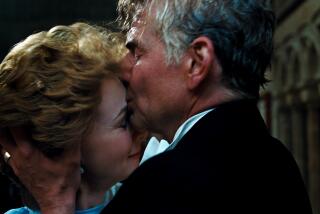MUSIC REVIEW : Soderstrom and Previn Offer an Intimate Recital at the Pavilion
- Share via
Elisabeth Soderstrom has been celebrated in her long operatic career for many memorable portrayals. The most memorable, perhaps, is the Marschallin in “Der Rosenkavalier.”
Richard Strauss and Hugo von Hofmannsthal’s mature, ultra-Viennese princess is, you will recall, a woman of extraordinary sensitivity and wit. One eye dry and the other moist, she embraces the inevitable passage of time, even takes a certain comfort in it.
She does so with lightness and grace, with charm and with dignity compromised only by occasional flashes of nostalgia. The sincerity of her resignation is made all the more poignant by easy elegance, by stubborn reminders of girlish purity and just a trace of urgent self-mockery.
The beloved Swedish soprano didn’t venture any Strauss at her first local recital, Wednesday night at the Dorothy Chandler Pavilion. But the aura of the Marschallin, this noble, poignant, heroically unaffected woman of the world, dominated Soderstrom’s ridiculously belated debut at every turn.
With none less than Andre Previn providing deft and sympathetic if somewhat casual support at the piano, she offered a program of uncompromising intelligence and stimulation. Soderstrom is not the sort of artist who sweetens her recitals with popular arias or obvious selections from the catalogue of Great Instant Hits. She does, however, explore and illuminate the gentle profundities of the intimate song.
On this occasion, she brought equal authority to the crusty Americana of Aaron Copland, to the mercurial Scandinavian sentiment of Peterson-Berger, Linde, Nielsen, Sibelius and Grieg, to the Germanic lyricism of Mendelssohn and to the Slavic pathos of Rachmaninoff and Tchaikovsky. As a gracious if somewhat dubious piece de resistance , she attempted to clarify the platitudinous murk of five Philip Larkin poems as set by Previn for Janet Baker in 1978.
At encore time she added an extraordinarily buoyant account of Schubert’s “Seligkeit” and, in a historical nod to Jenny Lind, the adorable folksy gimmickry of a Norwegian Echo Song.
Along with a few examples of amiable trivia, there was much to cherish: the wispy whimsy of Copland’s early translation of Emily Dickinson (“Why do they shut me out of Heaven?/Did I sing too loud?”), the crescendo of bitterness in Sibelius’ “Flickan kom, “ the dewy optimism of Mendelssohn’s “Fruhlingslied,” the canny pairing of nostalgic garden odes by Rachmaninoff and Tchaikovsky, the cheeky satire of the latter’s “Kukushka.”
Soderstrom never departed from her course of easy sophistication. She did flirt briefly with the hum-along crowd, however, when she programmed Grieg’s “Jeg elsker dig” (also known, in archaic terms, as “I Love Thee, Dear”), Mendelssohn’s “Flugeln des Gesanges” (Wings of Song ) and Tchaikovsky’s “Net, tolko tot, kto znal” (None but the Lonely Heart). Even in these familiar strains, she chose the elevating impact of simplicity over the temptation of the expressive heave.
Did everything cause delirium? Not quite.
Sometimes the soprano sounded understandably tired. Her silvery tone blanched, and pitch sagged. Some of her low tones threatened to evaporate. Although she never forced for impact--it simply isn’t her style--the 3,200-seat Pavilion is much too big a showcase for her essentially fragile art. The well-crafted Previn songs could not crown the evening in emotional glory.
At a private concert given at the L’Ermitage hotel the night before, Soderstrom had ventured the heroic narrative of Schubert’s “Erlkonig”. Now, that might have been climactic.
More to Read
The biggest entertainment stories
Get our big stories about Hollywood, film, television, music, arts, culture and more right in your inbox as soon as they publish.
You may occasionally receive promotional content from the Los Angeles Times.










